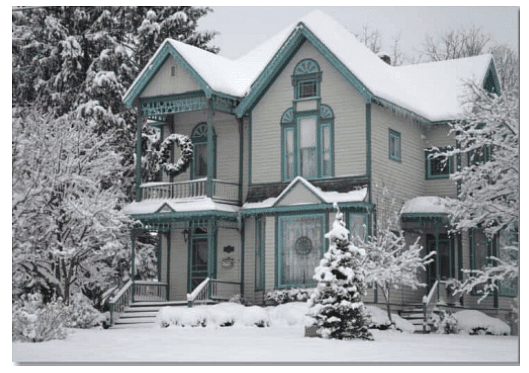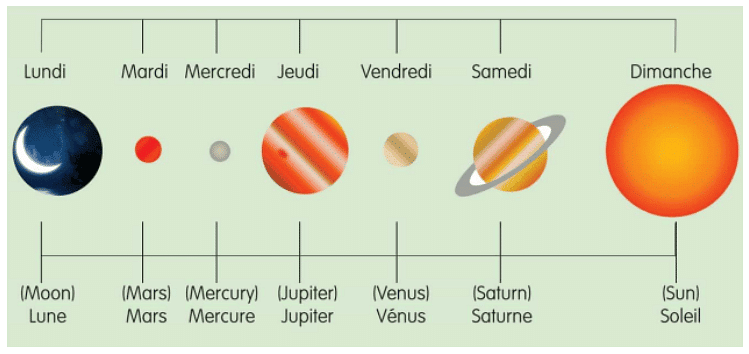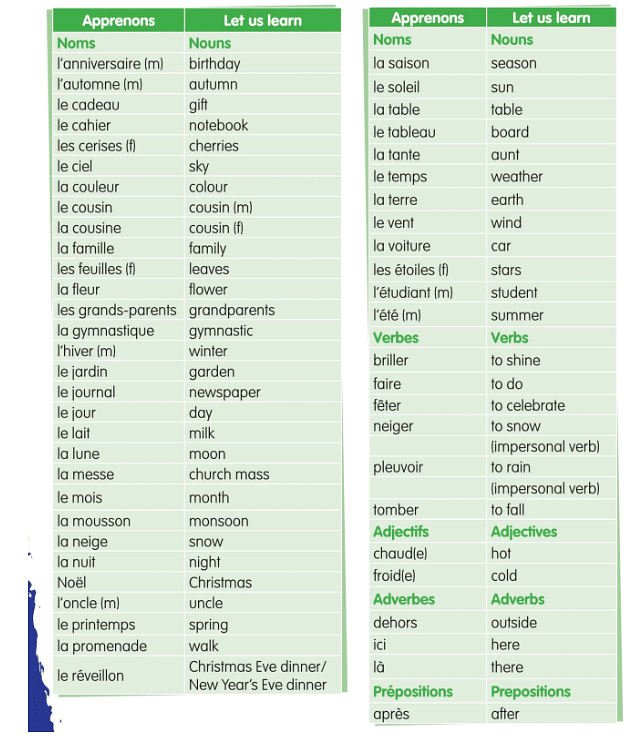C'est Noël (It's Christmas) Chapter Notes | French for Class 6 PDF Download
| Table of contents |

|
| C'est Noël (It's Christmas) |

|
| Changes in some of the "-er" ending verbs |

|
| La négation (Negation) |

|
| Les jours et les planètes (The days and the planets) |

|
C'est Noël (It's Christmas)
Aujourd'hui, c'est le 25 décembre.
(oh-zhoor-dwee, say luh 25 day-sahm-bruh)
Today is December 25th.C'est Noël et la famille de Manuel fête le Noël dans la maison.
(say noh-ell ay lah fam-ee duh mah-noo-ell fet luh noh-ell dahn lah may-zon)
It's Christmas and Manuel's family celebrates Christmas in the house.
Ils font un bonhomme de neige.
(eel fohn uh boh-nohm duh nayzh)
They make a snowman.Ils décorent le sapin avec des ampoules et des guirlandes électriques.
(eel day-kor-ahn luh sah-pan ah-vek day ahm-pool ay day gear-lahnd ay-lek-treek)
They decorate the Christmas tree with light bulbs and electric garlands.Le père de Manuel range les cadeaux près du sapin.
(luh pair duh mah-noo-ell rahnzh lay kah-doh pray dew sah-pan)
Manuel's father arranges the gifts near the Christmas tree.Il achète toujours de beaux cadeaux pour la famille.
(eel ash-et too-zhoor duh boh kah-doh poor lah fam-ee)
He always buys beautiful gifts for the family.Il fait froid dehors. C'est l'hiver et il commence à neiger.
(eel fay frwah day-or. say lee-vair ay eel koh-mahnss ah nay-zhay)
It's cold outside. It's winter and it starts to snow.Mais dans la maison, il ne fait pas froid grâce au chauffage central.
(may dahn lah may-zon, eel nuh fay pah frwah grah-suh oh show-fahzh san-trahl)
But in the house, it is not cold thanks to the central heating.Les grands-parents et les cousins de Manuel sont là.
(lay grahn-par-ahn ay lay koo-zan duh mah-noo-ell son lah)
Manuel's grandparents and cousins are there.L'oncle et la tante de Manuel habitent en Australie.
(lon-kluh ay lah tahn-tuh duh mah-noo-ell ah-beet ahn ohs-trah-lee)
Manuel's uncle and aunt live in Australia.Ils arrivent aujourd'hui. En Australie, c'est l'été en décembre et il fait chaud.
(eelz ah-reev oh-zhoor-dwee. ahn ohs-trah-lee, say leh-tay ahn day-sahm-bruh ay eel fay show)
They arrive today. In Australia, it's summer in December and it's hot.La famille de Manuel prend le réveillon après la messe.
(lah fam-ee duh mah-noo-ell prahn luh ray-vay-yohn ah-pray lah mess)
Manuel's family has the Christmas Eve dinner after the mass.
Changes in some of the "-er" ending verbs
Verb "acheter" (to buy)
- Note: There is an accent grave (`) on the "e" in the singular forms.
Other conjugated verbs like acheter:
- peser (to weigh)
- geler (to freeze)
- mener (to lead)
Verb "commencer" (to begin)

- Note: The "c" takes a cedilla (ç) in the "nous" form to retain the sound of "s".
Verb "appeler" (to call)
- Note: There is doubling of the "l" before the silent endings.
Verb "jeter" (to throw)
- Note: There is doubling of the "t" before the silent endings.
Verb "faire" (to do/to make)
La négation (Negation)
- In negative sentences, the indefinite articles (un, une, des) become de and d' before vowels and silent h.
Examples:
Elle a un stylo. (She has a pen.)
Elle n'a pas de stylo. (She doesn't have a pen.)Elle a des stylos. (She has pens.)
Elle n'a pas de stylos. (She doesn't have pens.)Elle a une règle. (She has a ruler.)
Elle n'a pas de règle. (She doesn't have a ruler.)Elle a des règles. (She has rules.)
Elle n'a pas de règles. (She doesn't have rules.)Il y a un étudiant. (There is a student.)
Il n'y a pas d'étudiant. (There isn't a student.)
Note: This rule does not apply to the verb être.
For example, with the verb être:
C'est un stylo. (It's a pen.)
Ce n'est pas un stylo. (It's not a pen.)Ce sont des étudiants. (They are students.)
Ce ne sont pas des étudiants. (They are not students.)C'est de la soupe. (It's some soup.)
Ce n'est pas de la soupe. (It's not some soup.)
The definite articles (le, la, les) remain unchanged after all negative forms.
Examples:
Elle a le stylo. (She has the pen.)
Elle n'a pas le stylo. (She doesn't have the pen.)Elle a les stylos. (She has the pens.)
Elle n'a pas les stylos. (She doesn't have the pens.)Elle a la règle. (She has the ruler.)
Elle n'a pas la règle. (She doesn't have the ruler.)Elle a les règles. (She has the rules.)
Elle n'a pas les règles. (She doesn't have the rules.)
Les jours et les planètes (The days and the planets)


|
17 videos|44 docs
|















